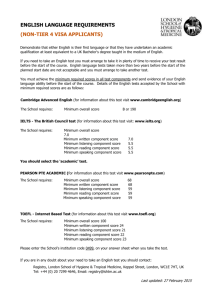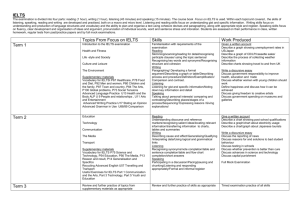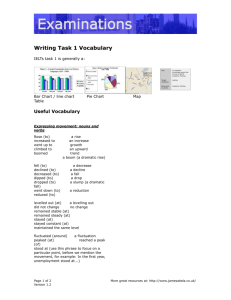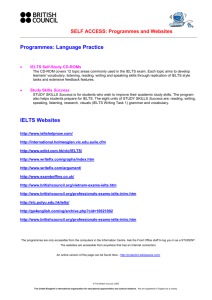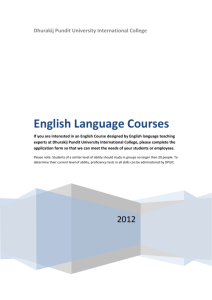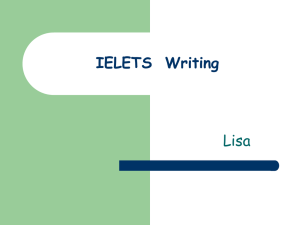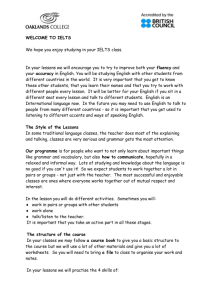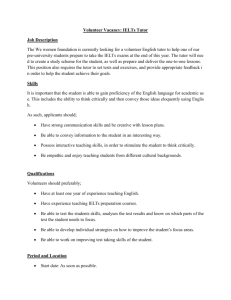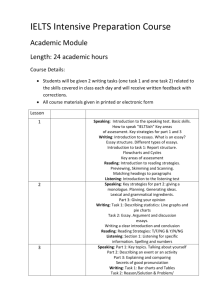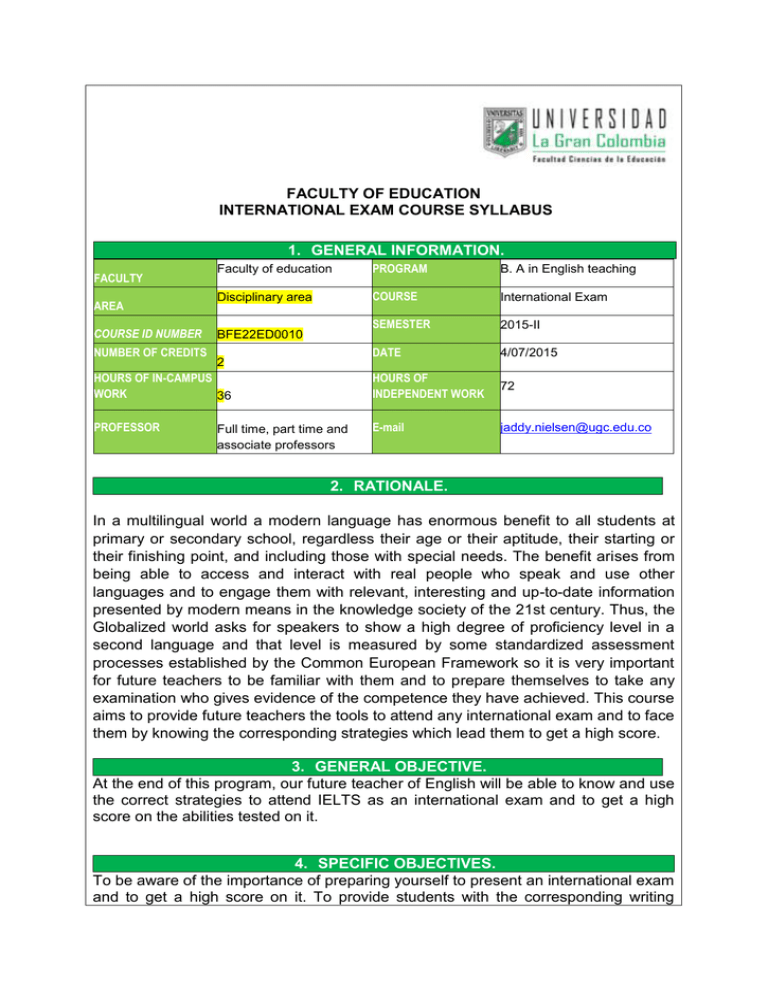
FACULTY OF EDUCATION
INTERNATIONAL EXAM COURSE SYLLABUS
1. GENERAL INFORMATION.
Faculty of education
PROGRAM
B. A in English teaching
Disciplinary area
COURSE
International Exam
SEMESTER
2015-II
DATE
4/07/2015
HOURS OF IN-CAMPUS
WORK
36
HOURS OF
INDEPENDENT WORK
72
PROFESSOR
E-mail
jaddy.nielsen@ugc.edu.co
FACULTY
AREA
COURSE ID NUMBER
NUMBER OF CREDITS
BFE22ED0010
2
Full time, part time and
associate professors
2. RATIONALE.
In a multilingual world a modern language has enormous benefit to all students at
primary or secondary school, regardless their age or their aptitude, their starting or
their finishing point, and including those with special needs. The benefit arises from
being able to access and interact with real people who speak and use other
languages and to engage them with relevant, interesting and up-to-date information
presented by modern means in the knowledge society of the 21st century. Thus, the
Globalized world asks for speakers to show a high degree of proficiency level in a
second language and that level is measured by some standardized assessment
processes established by the Common European Framework so it is very important
for future teachers to be familiar with them and to prepare themselves to take any
examination who gives evidence of the competence they have achieved. This course
aims to provide future teachers the tools to attend any international exam and to face
them by knowing the corresponding strategies which lead them to get a high score.
3. GENERAL OBJECTIVE.
At the end of this program, our future teacher of English will be able to know and use
the correct strategies to attend IELTS as an international exam and to get a high
score on the abilities tested on it.
4. SPECIFIC OBJECTIVES.
To be aware of the importance of preparing yourself to present an international exam
and to get a high score on it. To provide students with the corresponding writing
techniques which promote coherent writing related to daily issues as well as
academic references. To give students the necessary tools to understand the main
ideas of a complex text on both concrete and abstract topics. To enable students to
speak with a high degree of fluency and letting them face the speaking part of
international exams. To provide students with the most useful and necessary
techniques to present listening tests and show proficiency on them.
5. AREA DISCUSSION PROBLEM.
Which are the necessary pedagogical, communicative, technological and
investigative competences in the pre-service teachers’ education in order to foster
meaningful changes in their social context?
How can students develop their communicative competence in order to attend any
international exam and to show a high proficiency level on the abilities tested?
6. COURSE DISCUSSION ISSUES.
1) Which are the appropriate pedagogical, communicative, and technological
and research skills a foreign language learner has to develop in order to
present any international test?
2) How can we enable learners to increase their English level and foster them
attend an international test?
3) Which methodologies and strategies are required to help the students of this
course apply an International Exam?
7. COMPETENCES.
Students understand the main ideas of complex text on both concrete and abstract
topics, including technical discussions in his/her field of specialization. They interact
with a degree of fluency and spontaneity that makes regular interaction with native
speakers quite possible without strain for either party. Students produce clear,
detailed text on a wide range of subjects and explain a viewpoint on a topical issue
giving the advantages and disadvantages of various options. They are able to
communicate with the emphasis on how well it is done, in terms of effectiveness,
sensitivity and the capacity to deal with unfamiliar topics. Students are able to
achieve most goals and express oneself on a range of topics. Students can express
oneself in a limited way in familiar situations and to deal in a general way with nonroutine information. They can deal with simple, straightforward information and begin
to express oneself in familiar contexts.
8. ACTIVITIES.
Week
1
Topics
What are the class
expectations?
Teaching Activities
Guided mediation
about reading aloud
The Syllabus,
making agreements
What is the Common
about the course
European
headlines and
Framework, why is it
establishing
important?
appropriate
Time
2
Independent work
Students surf the web
looking for what an
International exam is and
write a report about the
existing ones and their
importance
Time
4
Designing a conceptual map
about the main elements of
the Common European
Framework
assessment
techniques for the
course
Guided mediation
about Explaining
what the CEFR is,
its components and
its importance for
English teaching.
Kinds of
International exams.
2
3
4
5
6
Guided mediation
on reading three
extracts which are
all concerned in
some way with
How can we work on
scientific research
the different
and answering a set
international exams
of questions in
and get ready for the
which you choose
IELTS international
the answer (A, B, C
examination?
or D) which you
think fits best
according to the
text.
How can we work on
the IELTS listening
Guided mediation
section and get
on Listening section
ready for
1.
LISTENING FULL
TEST?
Development of a listening
mock test section 1.
4
2
Development of a listening
mock test section 2.
4
2
Development of a listening
mock test section 3.
4
Assessment and
feedback process
2
Assessment and feedback
process
Guided mediation
on Listening section
2
Development of a listening
mock test section 4.
How can we work on
the IELTS listening
Guided mediation
section and get
on Listening section
ready for
3.
LISTENING FULL
TEST?
7
How can we work on
4
2
How can we work on
the IELTS listening
Guided mediation
section and get
on Listening section
ready for
2.
LISTENING FULL
TEST?
First Strike Exam
(Listening section
1, 2 and 3)
2
Students surf the web about
content based Backgrounds
principles and important
aspects.
4
the IELTS listening
section and get
ready for
LISTENING FULL
TEST?
8
9
10
11
12
13
14
15
4.
How can we work on
the IELTS Reading
section and get
ready for a
READING FULL
TEST?
Correction, guided
mediation and
strategies on
reading passage 1
How can we work on
the IELTS Reading
section and get
ready for a
READING FULL
TEST?
Correction, guided
mediation and
strategies on
reading passage 2
CONGRESS OF
EDUCATION
CONGRESS OF
EDUCATION
How can we work on
the IELTS Reading
section and get
ready for a
READING FULL
TEST?
Correction, guided
mediation and
strategies on
reading passage 3
How can we work on
the IELTS Writing
section and get
ready for WRITING
FULL TEST?
Second strike Exam
(listening and
reading sections)
How can we work on
the IELTS Writing
section and get
ready for WRITING
FULL TEST?
How can we
compare, give
personal information,
opinions and discuss
Guided mediation
on writing task 1.
Assessment and
feedback process
Guided mediation
on writing task 2.
Correction, guided
mediation and
strategies on
speaking parts 1, 2
and 3.
2
Correction of reading passages
1.
4
2
Correction of reading passages
2.
4
2
2
2
2
CONGRESS OF EDUCATION
Congress activity in the library
and correction of reading
passages 3.
Development of a writing mock
test task 1.
4
4
4
Assessment and feedback
process
2
Development of a writing mock
test task 2.
4
2
Development of a speaking
mock tests parts 1, 2 and 3.
4
on the IELTS
speaking section
and get ready for
SPEAKING FULL
TEST?
16
17
18
How can we
compare, give
personal information,
opinions and discuss
on the IELTS
speaking section
and get ready for
SPEAKING FULL
TEST?
Correction, guided
mediation and
strategies on
speaking parts 1, 2
and 3.
IELTS MOCK
IELTS MOCK
FINAL EXAM AND
FEEDBACK
SESSION
IELTS
International Exam
2
Development of a speaking
mock tests parts 1, 2 and 3.
IELTS MOCK
2
2
4
2
IELTS International Exam
9. READING PLAN.
N/A
10. ASSESSMENT CRITERIA.
TYPE OF
PERCENTAGE%
ASSESSMENT:
DATE
ASSESSMENT ACTIVITIES
First partial grade
30%
6th week According to the professor’s criteria
Second partial
grade
30%
11th week According to the professor’s criteria
Third partial grade
15%
15th week According to the professor’s criteria
Final Exam
20%
16th week Written test.
Self-Assessment
and PeerAssessment
5%
End of
Checklist with established criteria.
semester
11. REFERENCES
British Council. (2009). One-day IETLS Seminar. Bogotá: British Council Colombia.
Cambridge University. (2011). Cambridge IELTS 7. Cambridge: Cambridge
Unversity Press.
Hopkins.D & Cullen.P. (2007). Grammar for IELTS. Cambridge: Cambridge
University Press.
O'Connell.S. (2009). Focus on IELTS. Edinburg Gate: Pearson Longman.

